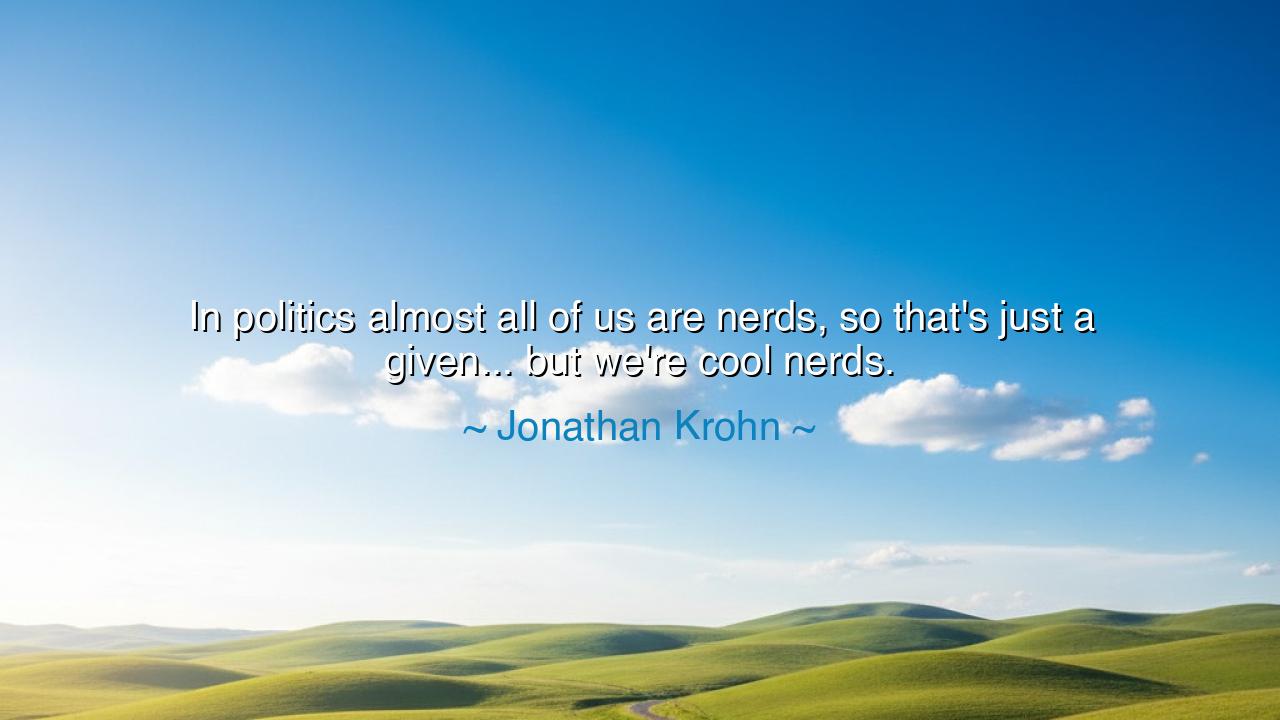
In politics almost all of us are nerds, so that's just a given...
In politics almost all of us are nerds, so that's just a given... but we're cool nerds.






In the grand journey of human civilization, there has always been a tension between the intellectual and the popular, between those who think deeply and those who seek to be seen as bold and charismatic. Jonathan Krohn’s words, “In politics almost all of us are nerds, so that’s just a given... but we’re cool nerds,” speak to this eternal truth—that even those who hold great power and influence in society are often driven by a passion for knowledge and intellectual engagement. However, Krohn adds an essential nuance to this: that being knowledgeable and thoughtful doesn’t preclude one from being effective or charismatic. In fact, these qualities can enhance the very essence of leadership, making the so-called "nerds" of politics not just wise, but cool in their own right.
The ancients understood this dynamic well. In Greek philosophy, there was no distinction between being intellectually gifted and being engaged in leadership. Socrates, for instance, was a man of profound wisdom, yet his influence was felt throughout Athens not because of his social status or popularity, but because of his ability to engage others in meaningful discussion. He was not the “cool” figure in the traditional sense, but his ideas were revolutionary, and in this, he became an intellectual hero. Socrates was a nerd of his time, but he was, without a doubt, a cool nerd, someone whose influence grew because he applied his intellectual gifts to the betterment of society.
Similarly, consider the life of Alexander the Great, who, although known for his military prowess and boldness in battle, was also deeply influenced by philosophers and scholars. One of his greatest mentors was Aristotle, a philosopher and nerd in his own right, whose ideas about ethics, politics, and knowledge shaped Alexander’s worldview. Alexander, though often seen as a warrior king, recognized the importance of intellectual development, and it was this balance between intellect and action that allowed him to become the leader of one of the greatest empires in history. Much like Krohn’s perspective, Alexander embodied the fusion of being both a thinker and a doer, a nerd and a leader, and thus became a cool nerd whose legacy still impacts the world today.
In the modern age, politics has often been seen as the domain of the powerful and charismatic, but Jonathan Krohn’s statement calls attention to the fact that beneath the surface, many political figures are also driven by the desire for knowledge and a deep intellectual curiosity. Take, for example, Barack Obama, who, while known for his eloquence and leadership, also spent much of his time engaged in thoughtful study of history, philosophy, and political theory. Obama’s rise to power was not just because of his charisma but because of his ability to think critically, to engage with complex issues, and to lead with intellectual humility. In this way, Obama exemplified the cool nerd of modern politics: someone who embraced their intellectual depth and used it to lead effectively.
The lesson here is clear: intellectual strength and charisma are not mutually exclusive. The ancients understood that wisdom could be a source of power, and the modern world still benefits from this understanding. Just as Socrates and Alexander the Great showed us, true leadership often comes from those who are not only bold and charismatic but also thoughtful and intellectually engaged. The nerds of the world, whether in politics or in other fields, have the ability to shape the future by applying their minds to the challenges at hand, and it is this combination of intellect and action that can make them cool leaders, capable of transforming society.
In your own life, think about how you can embrace both thoughtfulness and action. Knowledge, when coupled with the desire to make a difference, can lead to meaningful change. Do not shy away from being the nerd—the one who asks questions, the one who seeks understanding, the one who strives for wisdom. But also, don’t forget that wisdom without action is incomplete. Just as Socrates engaged his fellow Athenians in conversation, and Obama shaped policy through intellectual rigor, you too can be a cool nerd—someone who uses knowledge to create change, to lead, and to inspire others. The future belongs to those who can balance thinking with doing, who can be bold in intellect and courageous in action.
Embrace the power of being a nerd—for it is in curiosity, thoughtfulness, and intellectual engagement that true leaders are born. Let your knowledge be not just a source of personal pride but a force for good that shapes the world around you. Like Krohn, strive to be both intellectual and charismatic, and know that it is not just the surface qualities that define greatness, but the depth and wisdom you bring to the challenges of the world.






AAdministratorAdministrator
Welcome, honored guests. Please leave a comment, we will respond soon